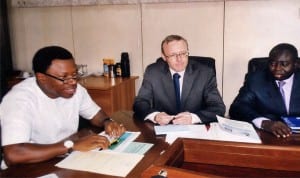Business
‘FG Lost N10bn In Oil Revenue To Strike’
Chairman, South-West Chapter of the National Union of Petroleum and Natural Gas, Tokunbo Korodo, on Tuesday said that over N10 billion revenue was lost during the five-day strike by its union.
The operation of Nigerian National Petroleum Corporation was shut down on September 15 due to non-payment of N85bn pension benefits.
The strike was suspended on September 19 after a meeting between the NNPC management and the two unions of oil workers.
Korodo said the Independent Petroleum Marketers Association of Nigeria, Petroleum Tanker Drivers, NUPENG and NNPC were losing more than N2m on daily in the South-West region during the strike.
He said business activities within NNPC depot in Ejigbo and Mosinmi were also paralysed, adding food vendors and credit card sellers and other businesses also lost more than N5m within the period.
The chairman, however, said the strike was put on hold because of the intervention of the National Assembly, which promised to resolve the matter.
According to him, the NNPC management has not fulfilled its own part of the pension scheme till now.
He said, “The NNPC management has not paid their N85 billion pension till now.
“We are imploring the National Assembly to prevail on the NNPC management to pay their part of the scheme because oil workers have paid their part.”
Business
Nigeria’s ETF correction deepens as STANBICETF30, VETGRIF30 see 50% decline in a week

Business
BOI Introduces Business Clinic

Business
Dangote signs $400 mln equipment deal with China’s XCMG to speed up refinery expansion

-
Maritime1 day ago
Customs Declares War Against Narcotics Baron At Idiroko Border
-
Maritime1 day ago
Nigeria To Pilot Regional Fishing Vessels Register In Gulf Of Guinea —Oyetola
-

 Sports1 day ago
Sports1 day agoGombe-Gara Rejects Chelle $130,000 monthly salary
-
Maritime1 day ago
NIMASA,NAF Boost Unmanned Aerial Surveillance For Maritime Security
-
Maritime1 day ago
NIWA Collaborates ICPC TO Strengthen Integrity, Revenue
-

 Sports1 day ago
Sports1 day agoTEAM RIVERS SET TO WIN 4×400 ” MORROW” …Wins Triple jump Silver
-

 Sports1 day ago
Sports1 day agoNSC eyes international hosting rights
-

 Sports1 day ago
Sports1 day agoNPFL Drops To 91st In Global League Rankings


